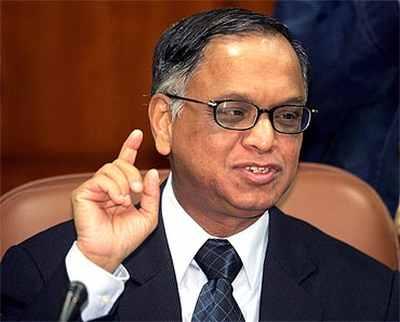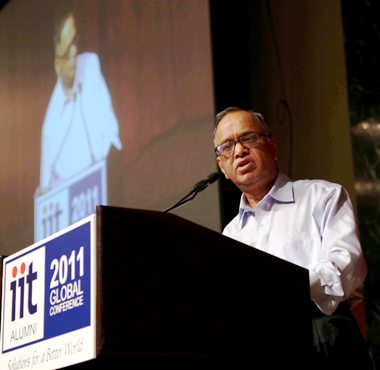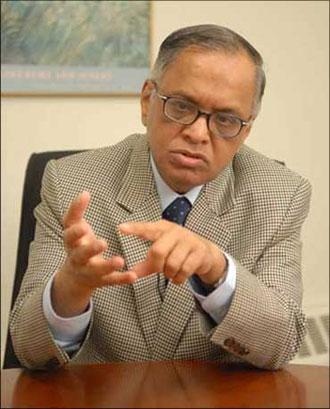Photographs: Reuters Raghuvir Badrinath in Bengaluru
N R Narayana Murthy makes.
After having helped build Infosys as a force to reckon with in the international arena, he formed Catamaran Ventures.
The money came from his wife and he selling part of their stake in Infosys to create a corpus of a little over Rs 600 crore (Rs 6 billion).
It has been slightly over two years since Arjun Ramegowda Narayanswamy, 32, a MIT graduate, was roped into managing the fund.
. . .
Murthy's 2nd innings a big success as well
It has made investments in a handful of companies -- for instance, in Manipal Universal Learning, SKS Microfinance and in Footprint Ventures, marketer of an energy drink.
These are the names which have managed to come out in the public domain from this intensely private family office fund, managed by Narayanswamy, who has earlier worked with Bain Capital, the globally known buyout fund.
In perhaps the first ever media discussion on how this fund is run and what plans are being strategised, Narayanswamy told Business Standard they'd like to stick to what they've been doing, just tweaking a little to account for changes in market conditions.
. . .
Murthy's 2nd innings a big success as well
Photographs: Paresh Gandhi/rediff.com
The basic strategy will remain the same -- multi-stage, multi-sector.
Having said that, Catamaran has been slowly fine-tuning its strategy and is on track to evolve into a full-fledged family office structure such as the Rockefeller Family Office and other global renowned endowments.
"We are continually looking for diversification, but in a thoughtful way.
As of now we are not looking at LP (Limited Partner) investing as a core strategy; it is more exception-driven.
Over time, we expect to transition more to an LP-based approach, much like the US family offices and endowments," Narayanswamy told Business Standard.
. . .
Murthy's 2nd innings a big success as well
Photographs: Parth Sanyal/Reuters
Structure, issues
Catamaran has been structured as an evergreen fund, meaning the returns will support a number of activities, including those of the Murthy family foundation.
"We are talking to and adapting the best practices from some of the best-run endowments, be they the universities or foundations across the world.
"Therefore, we have to think through liquidity and exit in a very careful way," he detailed.
As with the issue many venture and private equity funds face in India, Catamaran is also wary about exits. "On the private equity side, the story is much more volatile.
"There are a few exits and many LPs we talk to are concerned about their India portfolio.
. . .
Murthy's 2nd innings a big success as well
Image: N R Narayana Murthy.Photographs: Nilotpal/Outlook Group
"We will continue to look at angel (investing) and also at Series X/mezzanine opportunities (mezzanine financing is a mix of debt and equity; Series X is Catamaran's term for the level of investment in which they are the last private investor before an exit) in a selective way.
Probably, we may do less growth equity.
In any case, we will have to stay nimble until we feel the ecosystem stabilises," he explained.
Having started as a pure-play venture and a private equity fund, Catamaran has made one big change during the past year, to build a public/secondary market investment practice.
. . .
Murthy's 2nd innings a big success as well
Image: N R Narayana Murthy.Photographs: Reuters
A senior investment professional, K G Lakshminarayanan, runs a team which focuses 100 per cent on public markets, through which they are invested mostly in fairly liquid stocks with a long-term view.
However, it is a tough scenario.
"The reason is simply that India is an emerging market, where particular stages and sectors become hot or cold very fast.
"It is common to see big sentiment swings in a sector.
"Even in our public markets, it doesn't take too much to make valuations in a sector soar or dip dramatically.
. . .
Murthy's 2nd innings a big success as well
"So, in public markets, there is a reward for patience and for being contrarian and taking a longer-term view. We will stick to that," Narayanswamy said.
Thinking
This move to spread the wings has been crystallised after a process of thinking through how best to support entrepreneurs, the bedrock on which this fund was set up.
"Having a series X/mezzanine strategy and a public market practice where large investments can be made allows us to make small seed-stage investments without pressure.
"We do not have a preferred and sometimes restrictive view on ticket size. . . small investments or stakes in talented entrepreneurs or unusual businesses is okay," Narayanswamy explained.
. . .
Murthy's 2nd innings a big success as well
Photographs: Reuters
Its investments -- Series X/mezzanine, as noted -- are in some cases straight equity investments; in others, structured equity or mezzanine return ones.
And, having discussed various fund-specific aspects, it would be pretty hard not to discuss the macro scenario in India. Narayanswamy has strong views, just like Murthy.
"The level of uncertainty on taxation and regulation is quite high.
"We are spending a lot of time and energy -- even as a domestic family investor, with no external money -- trying to stay up to speed with all the changes.
"We hope that we're just going through a phase, and this is not permanent.
"If it is permanent, naturally our appetite to do private investing in India will get weaker," he said.










article